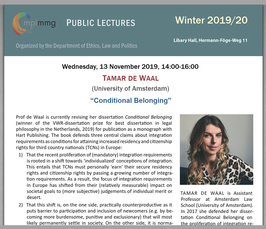"Conditional Belonging"
Public Lectures Winter 2019/20
- Date: Nov 13, 2019
- Time: 02:00 PM - 04:00 PM (Local Time Germany)
- Speaker: Tamar de Waal (University of Amsterdam)
- TAMAR DE WAAL is Assistant Professor at Amsterdam Law School (University of Amsterdam). In 2017 she defended her disser-tation Conditional Belonging on the proliferation of integration re-quirements in EU Member States, for which she received the VWR-dissertation prize for best disser-tation in legal philosophy in the Netherlands. It examines the rela-tionship between the proclaimed commitment of Member States states to the core liberal-demo-cratic values of the EU and their actual integration laws and prac-tices. During her visit at MPI she will be revising her dissertation for publication as a monograph at Hart Publishing.
- Location: MPI-MMG, Hermann-Föge-Weg 11, Göttingen
- Room: Library Hall

For more details please contact adomeit(at)mmg.mpg.de.
Prof de Waal is currently revising her dissertation Conditional Belonging (winner of the VWR-dissertation prize for best dissertation in legal philosophy in the Netherlands, 2019) for publication as a monograph with Hart Publishing. The book defends three central claims about integration requirements as conditions for attaining increased residency and citizenship rights for third country nationals (TCNs) in Europe:
1) That the recent proliferation of (mandatory) integration requirements is rooted in a shift towards ‘individualized’ conceptions of integration. This entails that TCNs must personally ‘earn’ their secure residency rights and citizenship rights by passing a growing number of integra-tion requirements. As a result, the focus of integration requirements in Europe has shifted from their (relatively measurable) impact on societal goals to (more subjective) judgements of individual merit or desert.
2) That this shift is, on the one side, practically counterproductive as it puts barrier to participation and inclusion of newcomers (e.g. by be-coming more burdensome, punitive and exclusionary) that will most likely permanently settle in society. On the other side, it is norma-tively problematic, as it exploits the position of precarity of TCNs and insofar it produces or fuels hierarchies between native-born and immigrant citizens in their status of equal citizens.
3) That the remedy for this situation is an institutional ‘firewall’ that dis-connects integration policy from access to rights for TCNs. While the state has legitimate interests in promoting integration, access to increased rights should not be made conditional upon (individualized) integration standards. In this way, receiving EU states continue to have the option to adopt (mandatory) integration programs for TCNs as a support structure to meet a set of societal goals (e.g. increase language levels, promote participation in different societal spheres, etc.) But they cannot demand of them that they should ‘earn’ their residency or citizenship by completing and fulfilling certain integra-tion requirements.